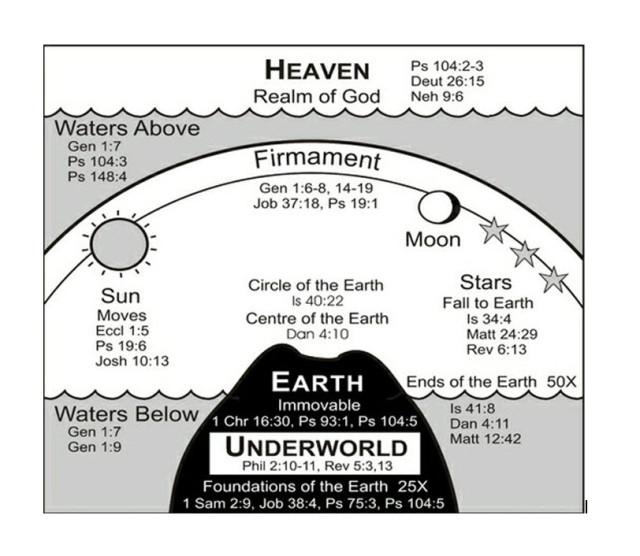This blog post is one part in a series on biblical hermenuetics. In the introduction to this series, I explained what biblical hermenuetics is and why it’s so important. In the previous blog post, I talked about the principle of reading Bible verses in context. In this blog post, I’m going to look at another hermenuetical principle which is:
Understanding The Cultural Context
We are very far removed in time from the times and places that The Bible talks about. As such, it can be easy to read a statement in light of how we would understand it in modern times. But we need to try our best to avoid doing that. As John Walton has said “The Bible was written for us, but it wasn’t written to us.” After all, “The book of Romans isn’t called The book of Romans for no reason.” The content of the book of Romans was intended for all people of all ages, but nevertheless, Paul was writing specifically to the church in Rome. The various books that make up The Bible were written to various different groups of people in various different periods of time. In order to get the best understanding of what scripture is saying, we need to try to step into the shoes of an ancient Israelite or a first century Jew. This is also known as “The Cultural Context Principle” of hermenuetics (here on out, CCP). We need to interpret scripture the way the original author would have understood it, and how the original audience would have understood it.
How Do You Know What The Cultural Context Is?
Sometimes it isn’t possible to have a thorough view of the culture from The Bible alone. You can certainly get ideas of the culture from The Bible, but looking at extra-biblical documents from the time period of the biblical event can give you a much broader view of what life was like at the time. For example, we know various things about how the government worked in first century palestine from the writings of people like Josephus and Tacitus. Archeological finds can also inform us of what the culture was like at the time. For the non-scholar, it’s usually best to have a concordance on hand as it will generally inform you about things like this. Looking into material from biblical scholars can also be informative. Get yourself Bible dictionary, Bible encyclopedia, and perhaps some good commentaries that provide reliable historical background of people and places. I found that Craig Evans’ book “Jesus And His World: The Archeological Evidence” was very informative. I learned things about the society Jesus grew up and lived in that I didn’t know before, and it really helped me see some of the passages of scripture in a way that I hadn’t before.
Examples Of Historical Context Illuminating The Meaning Of Scripture
Example 1: Abraham’s Hospitality in Genesis 18
In Genesis 18, Three Strangers come to see Abraham. We later find out that these three strangers were God appearing in human form (a theophany) and two angels appearing in human form. Abraham rushes out to greet these travelers and invites them back to his tent for a place to rest. He goes to Sarah and tells her to make a meal for them, and she does so. Afterwards, they reveal to Abraham who they are and tell him that Sarah will give birth to a child. Now, from our modern perspective, this seems really odd. Three people you don’t even know come walking by and you just invite them over for dinner? Who does that? “Hey there, whoever you are, come to my house to rest and get some free food!” A nice gesture, but it seems out of the ordinary to our modern sensibilities. However, Abraham’s behavior makes perfect sense when we have a historical understanding of how strangers were treated in the society and time period in which Abraham lived.
Lyndon Shook, of Grace Biblical Counseling Ministries writes “What we can learn from historical custom is that Abraham was acting according to accepted practices when he greeted strangers by running out and bowing before them, feeding and protecting them. His hospitality was consistent with honorable character in his day. Without historical context we are left thinking that Abraham is rather strange and obsessive in his behavior.” (quote from here).
It was common in that day to welcome travelers into your home for rest. An article from Theology Of Work project says “Seminomadic life in the country would often bring people from different families into contact with one another, and the character of Canaan as a natural land bridge between Asia and Africa made it a popular trade route. In the absence of a formal industry of hospitality, people living in cities and encampments had a social obligation to welcome strangers.” We know these things from evidence both from inside and from outside The Bible.
Example 2: Head Coverings
“Every man who prays or prophesies with his head covered dishonors his head. But every woman who prays or prophesies with her head uncovered dishonors her head—it is the same as having her head shaved. For if a woman does not cover her head, she might as well have her hair cut off; but if it is a disgrace for a woman to have her hair cut off or her head shaved, then she should cover her head.” – 1 Corinthians 11:4-6
This verse is used often by Pentecostals to keep womens’ hair long, and to keep their heads covered during services. A woman who doesn’t wear something over her head in church or who has short hair is considered by Pentecostals to be sinning. Pentecostals misinterpret this passage because they fail to understand the cultural context. What Paul is talking about in this biblical passage is a thing in the culture of Corinth that Paul was permitting in order to prevent disruption in the Corinthian church. If a woman shaved her hair, her shaved head was considered disgraceful. A woman’s hair was her “glory” (1 Corinthians 11:15). In the culture of Corinth, women had a covering for their heads to symbolize submission to their spouses. What Paul does here is merely affirm the correctness of that. To get rid of the head coverings wouldn’t send the right message to that culture. In fact, in verse 6, Paul says that if a woman refuses to wear a covering, she might as well shave all of her hair off! A woman who refused to wear a head covering in that time and place was essentially saying, by her action, that she wasn’t going to submit herself to the order of God.
In light of the cultural context, we can see that a woman who has short hair or doesn’t wear a hat in church isn’t doing anything wrong. Unlike most commands in scripture, this is a cultural mandate, not a universal moral demand. While the moral principle behind the cultural mandate is true at all times and all places (i.e that a woman should submit herself to her husband and God), the precise manner in which this is expressed (i.e having long hair and a head covering) is restricted to the Corinthian culture of the first century.
Example 3: I Go To Prepare A Place For You
“In my Father’s house are many mansions: if it were not so, I would have told you. I go to prepare a place for you.” – John 14:2 (KJV)
In this passage, Jesus is giving a discourse at the last supper. In John 14:2, he tells the disciples that He’s going to prepare a place for them in His Father’s house. He’s obviously talking about Heaven. And while you can get a basic understanding of what Jesus is talking about here even without knowing the cultural context, the cultural context actually shows that there’s deeper meaning to what Jesus is saying. Yes, He’s saying He’s going to Heaven to get things ready for us, but it goes beyond that.
In the ancient Jewish culture, a man would go to his family home and “prepare a place” for his bride before they were married so he had somewhere to take her once they were married. It’s that language that Jesus used to the Jewish people of “I’m going to prepare a place for you”. This corresponds nicely to those biblical passages affirming that we are the Bride of Christ (Ephesians 5:25-27, Revelation 19:7-9).
That cultural marriage picture is also seen in this: the groom would offer his intended bride (afterpaying the brideprice), a cup of wind. He was saying, “I offer you this cup, I love you, I offer my life”. The bride could take the cup and drink it, signifying that she accepted his offer, accepted his life and his love. By drinking it, she was saying that she accepts his gift, and she gives him her life in return. Wow! There was a whole layer of meaning under Jesus’ words that we didn’t even know about sans knowledge of the cultural context!
Example 4: Hot Coals, Yo!
Proverbs 25:22 says “For thou shalt heap coals of fire upon his head, and the LORD shall reward thee.” (KJV)
At first, this looks like a really mean way to punish someone. However, back in those days in that place, a young man in town would go around early in the morning from house to house passing out hot coals (i.e embers) to allow the wives to start their morning fires. The pot containing the coals would warm him up, and he would consider this a blessing if the morning was cold. The verse that comes right before verse 22 speaks of doing kindnesses to enemies, so in light of both the immediate context and the cultural context, this verse of The Bible makes a lot more sense.
Example 5: Accomadationism
As some of you know, I’ve recently moved away from Concordism to Accomadationism. What is accomadationism? As I addressed in a previous post, Accomadationism teaches that God did not intend to teach us science, and instead spoke His theological truths using the false cosmology of the Israelite’s day. He did this because if He gave scientifically accurate pictures of the world, He would have just simply confused the Israelites and they would have been so hung up on — what would be to them — bizarre views of the cosmos, like a spherical Earth, a sky with nothing solid to hold the clouds and stars up, and other scientific truths we take for granted today. Let’s say that God used evolution to bring about life [1]we’ll leave it an open question whether or not He did. If He did, and He put that in Genesis 1 or some of the other creation passages, the Israelites would have puzzled, and puzzled, and puzzled over how an ape could eventually give rise to a man, or a how birds could eventually become Dinosaurs. They would have seen these things as absurd and bizarre, and they would have totally missed the point of the creation narrative: That God is the Creator of all things, that He is sovereign, that the sun, moon, and stars are not gods in themselves, but mere creations of God, that mankind was created in His image, etc. etc. These are the theological truths God wanted to convey in Genesis 1.
Accomadationism posits that God was not concerned to correct the faulty science of the ancients during the time scripture was written. The ancient Israelites, as well as their neighbors, held to a sort of flat earth, dome cosmology, and you find this sort of cosmology in scripture (see the graphic below). On Accomadationism, God allowed these scientific misconceptions to get into scripture because correcting them wasn’t relevant to the points God was trying to make, and moreover, if He made these corrections, the people of that time would have quibbled amongst themselves about how these things could possibly be true, and they would have missed the whole point that the scriptural passages like Genesis 1 and Psalm 104 were trying to convey.
 |
| An artistic depiction of how ancient Hebrews saw the world and The Biblical passages describing aspects of it |
God’s point in Genesis 1 is that He is the Creator of everything that exists. Nothing came into being except through God’s creative power. If God had described the natural world correctly, contradicting the common wisdom of the day, then the people of that day and age would have been distracted, arguing and wondering how the sky could hold water if there’s no vault up there, or how people don’t fall off the Earth if it’s a sphere. God, in His wisdom, accommodated their scientific misunderstandings so that they would not miss the forest for the trees, and instead focus on the essential truths God was trying to convey.
This means that, for example, when we read passages like God “stretches out the heavens like a tent” (Psalm 104:2), it would be eisegesis to read Big Bang cosmology into that and say that it’s referring to the expansion of the universe. While I’ve made this argument in earlier blog posts, I no longer believe that it’s sound.
When I was a concordist, I held that the ancients would interpret scripture passages about nature in scientifically inaccurate ways, but that the texts are really saying something else, something we wouldn’t discover until thousands of years later. This is also what Hugh Ross told Kent Hovind in their debate back in 2,000. But the problem I now find with that approach is that it seems to make parts of scripture totally inaccessible to most of church history! This logically entails that only 20th century theologians would actually be able to get at what these passages are saying, and even Hugh Ross emphasizes that God intended The Bible for all generations. It’s sort of parallel to futurists asserting that only people approaching the end times would be able to get a grasp on what all the bizarre imagery in the book of Revelations is about; that things like moving statues are a prediction that there will be an animatronic of the anti-Christ! Of course, you might say “That’s true, but the science The Bible talks about isn’t that important anyway. They could get the theological truth God was trying to convey even if they didn’t get the scientific truth.” But, if you say that, then why not just become an accomadationist? If teaching accurate science in scripture wasn’t important to God in 500 B.C why would it be important in 2016 A.D?
I became an accomadationist precisely because the rules of proper hermenuetics compelled me to it. It would be utterly inconsistent of me to use the principle everywhere else in scripture, but abandon it whenever reading Bible passages about the natural world. To adhere to the cultural context principle everywhere else but exempt it when The Bible speaks of nature would actually be a logical fallacy called special pleading, which I talked about during my logical fallacy series. If we’re to be consistent exegetes, then we should read Bible passages in their historical context and not arbitrarily exempt passages.
Objection: Isn’t This Just A Modern Idea Influenced By Secularistic Thinking? Now, some might object that accomadationism is just a cave in to the modern scientific world, that it’s a liberal idea pressured by the skeptics who say that The Bible is scientifically innacurate or a liberal idea sculpted by pressure from evolutionary theory. But this is simply false. Accomadationism is at least as old as the protestant reformation itself!
John Calvin appealed to accommodation quite often. Below is a passage from his commentary on Genesis, in which he talks about the relative sizes of the Sun, Moon, and Saturn, in connection with Gen 1:16, which speaks of the “greater light” and the “lesser light”:
“[Moses] assigns a place in the expanse of heaven to the planets and stars; but astronomers make a distinction of spheres, and, at the same time, teach that the fixed stars have their proper place in the firmament. Moses makes two great luminaries; but astronomers prove, by conclusive reasons that the star of Saturn, which on account of its great distance, appears the least of all, is greater than the moon. Here lies the difference; Moses wrote in a popular style things which without instruction, all ordinary persons, endued with common sense, are able to understand; but astronomers investigate with great labor whatever the sagacity of the human mind can comprehend. … If the astronomer inquires respecting the actual dimensions of the stars, he will find the moon to be less than Saturn; but this is something abstruse, for to the sight it appears differently. Moses, therefore, rather adapts his discourse to common usage.”
When I was a concordist, I thought Moses called the “Greater Light” and “Lesser Night” by those names due to differing luminosity, rather than sizes, but ancients held that the moon really was bigger.
It’s a relief to know that theologians hundreds of years ago like John Calvin held to accomadationism. This shows that this isn’t some liberal idea conjured up in the 21st century to harmonize science and scripture, but can be a theologically valid idea. After all, neither John Calvin nor his contemporaries knew anything about the age of the Earth or evolution.
Objection: Doesn’t This View Forfeit Inerrancy?
When I read the works of accomadationists, I got very uncomfortable. I thought to myself “Well, great. Now I’m caught between sound heremenuetics and my commitment to biblical inerrancy. What’ll I do?” I thought admitting that The Bible contained outdated cosmology was to concede the inerrancy debate to the skeptics. The thing is, we need to understand what we mean by inerrancy. What is inerrancy? According to the previous version I held, The Bible was inerrant in everything it said. However, some define it as “The Bible is inerrant in everything that it intends to teach.” On that definition then, we’d also have to ask the question “What does The Bible intend to teach?” It certainly intends to teach us theological truths; truths about God. It also intends to accurately record historical events. After all, many theological truths are grounded in historical events. The theological doctrine of the atonement is grounded in Jesus’ death and resurrection, for example. It intends to teach us moral truths as well (e.g The Ten Commandments). But does it intend to teach us science? I don’t think so. Only if it intended to teach us science, would it be in error when it talks about things like the solid dome sky. If God didn’t intend to be a science teacher, there’s no problem.
God knew that we would find out the truth about the universe through scientific investigation eventually. Therefore, He didn’t need to tell us these things in His word. He gave us two books; the book of scripture and the book of nature. What we don’t learn from one, we can learn from the other.
For More Information On Accomadationism
A lot more could be said on the subject of concordism and accomadationism. For those interested, check out the following articles, mostly by the bloggers at BioLogos.
“From The Mailbag: Why Would God Allow Scientific Errors In The Bible?” — Various Authors.
“The Ancient Science In The Bible” – by Denis Lamoureux
“The Firmament Of Genesis 1 Is Solid, But That’s Not The Point.” – by Peter Enns
“A Critique Of Hugh Ross’ Interpretation Of Genesis 1” – by Richard Bushey
Conclusion
We’ve seen 4 good examples of how knowing the cultural context can enhance our understanding of The Biblical text.
References
| ↑1 | we’ll leave it an open question whether or not He did |
|---|





